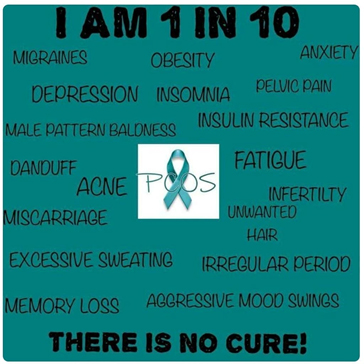PCOS: Polycystic Ovarian Syndrome
PCOS: Polycystic Ovarian Syndrome: I am 1 in 10

What is Polycystic Ovarian Syndrome?
Polycystic ovary syndrome (PCOS) is a genetic, hormone, metabolic and reproductive disorder that affects up to 15% of women in the U.S. (over 20% in some parts of the world). It is one of the most common human disorders and the most common endocrine (hormone) disorder and cause of infertility in women. It can lead to lifelong complications, psychosocial disorders, type 2 diabetes, cardiovascular disease, endometrial cancer, and other serious and life-threatening conditions. (https://pcosawarenessmonth.org/what-is-pcos/)
What Causes PCOS?
While the exact causes of PCOS are unclear, the effects of PCOS on your body and a woman’s fertility are well-documented. Women with PCOS create a higher-than-average level of androgens. Androgens are normally present in both sexes, but typically are considered “male hormones.” Elevated androgen levels in women will affect the development of eggs and interfere with ovulation. For this reason, women with PCOS may not ovulate regularly, or at all. Genetic and environmental factors appear to play a part in the development of the condition and PCOS tends to run in families. (https://www.mireproductivemedicine.com/september-pcos-awareness-month-2/)
What Are the Symptoms of PCOS?
Individuals may experience irregular menstrual periods or skipped periods. There may be unwanted hair growth on the face or body and hair thinning may occur. Some individuals experience acne. Most often an individual with PCOS may have difficulty ovulating and getting pregnant. Additionally, individuals may develop sleep problems, weight gain, insulin resistance, mood changes, or fatigue.
How Is PCOS Diagnosed?
A doctor will perform several tests to diagnose PCOS. A comprehensive physical exam will help to rule out other causes of the symptoms. The doctor may perform a pelvic exam to detect any masses such as cysts that appear on the reproductive organs. There may be a transvaginal ultrasound scheduled to detect any abnormalities in the pelvis. Additionally, blood tests are ordered to determine hormone levels, cholesterols levels, triglycerides, and blood sugar levels.
What Treatments Are Available for PCOS?
Treatments focus on managing the symptoms of PCOS. For example, birth control pills are often used to regulate periods, and hormone medications are used to balance hormone levels. Although there is no cure for PCOS, treatments are available to manage the symptoms.
I am a Doctor and I have PCOS (Dr. Shamva Wright-Shingler)

Several years ago, I was diagnosed with PCOS. I tried my best to hide from it. But the symptoms became too prominent to ignore. PCOS causes excessive facial hair growth, weight gain, infertility (w/treatment you can conceive).
The hardest part for me was going from having smooth skin to spots from hair growth and having to hear, when are you going to have a baby? What are you waiting for to give your husband a child? Trust me If it was that easy, I’d have six by now.
After turning 40, I decided to come out from hiding. I’m no longer embarrassed, or ashamed because this is me. I’ve been mentoring several ladies with the disorder while hiding the fact that I have it too. I got tired of thinking that the spots caused me to look unattractive because spots and pimples were appearing in places where they were not visible days prior.
I got tired of wondering why the weight gain just won’t stop. I had to take a moment and think to myself, how can I take care of others while feeling incomplete inside myself. So, the first step was acknowledging and accepting that this is only a disorder and it’s not life threatening. The second step was an action step.
I joined an amazing group of ladies, my Cysters and we have been advocating and supporting each other. There are so many women who are struggling and have no idea that they have PCOS. PCOS affects 1 in 10 women, and I am one of them.





